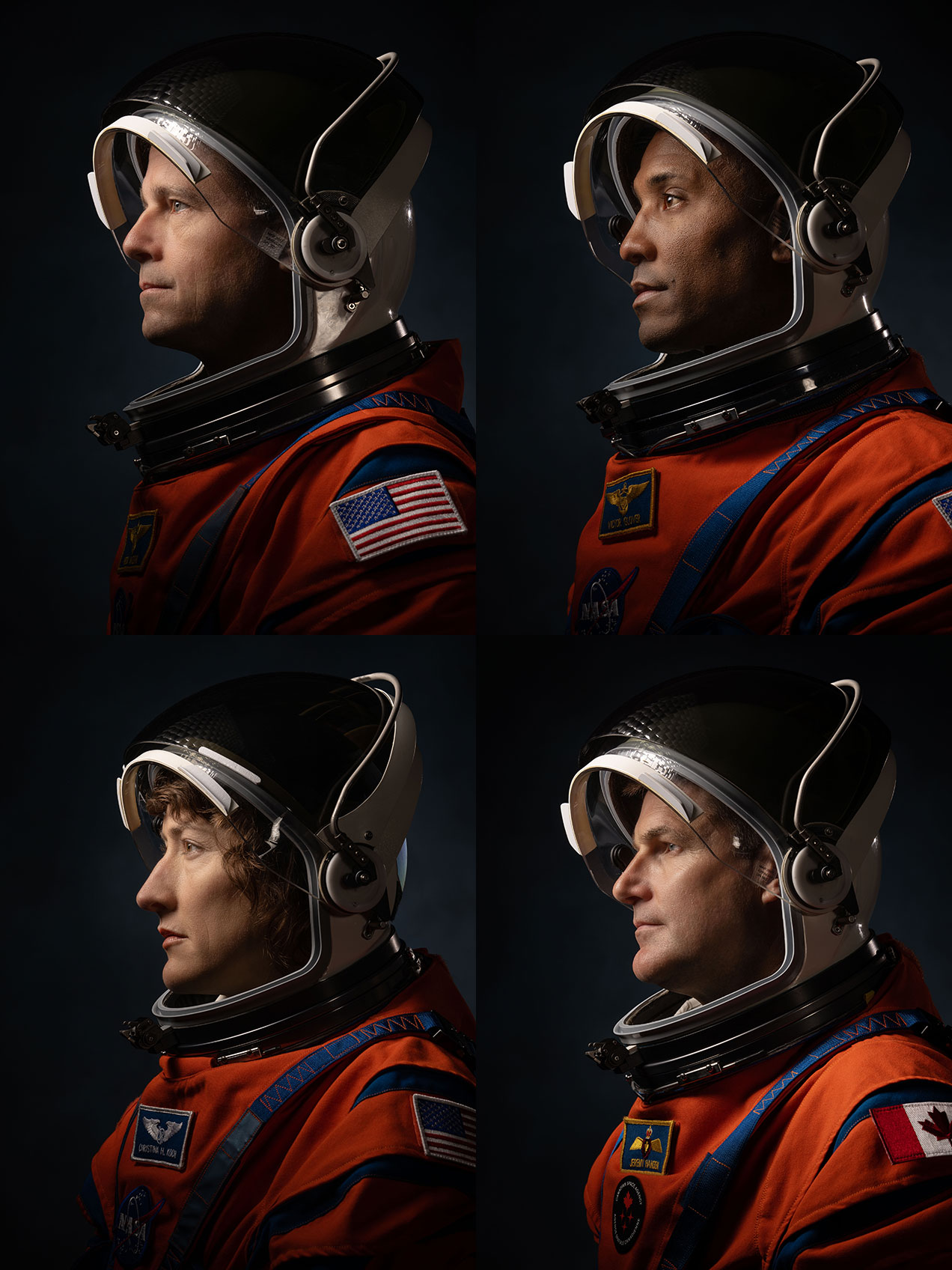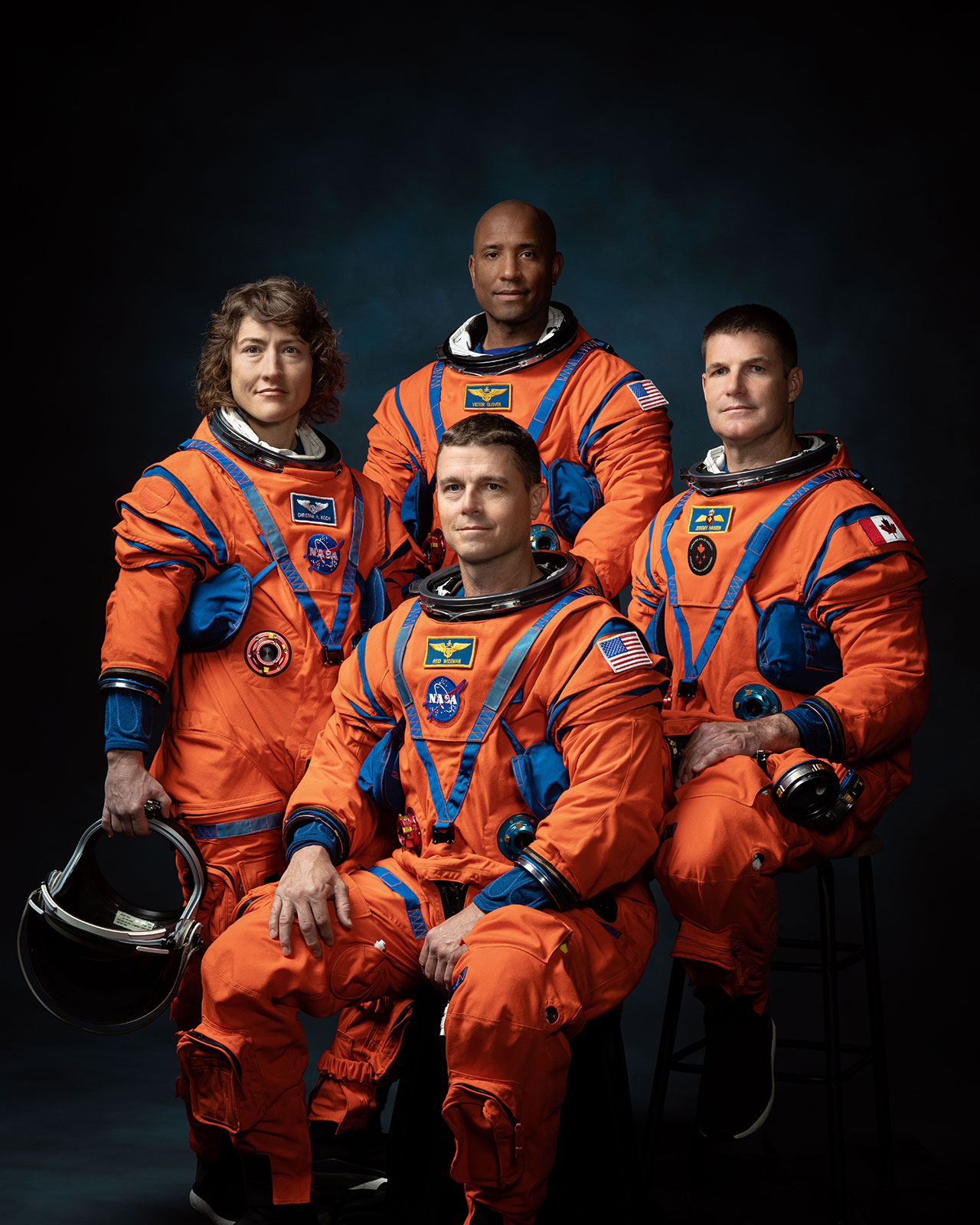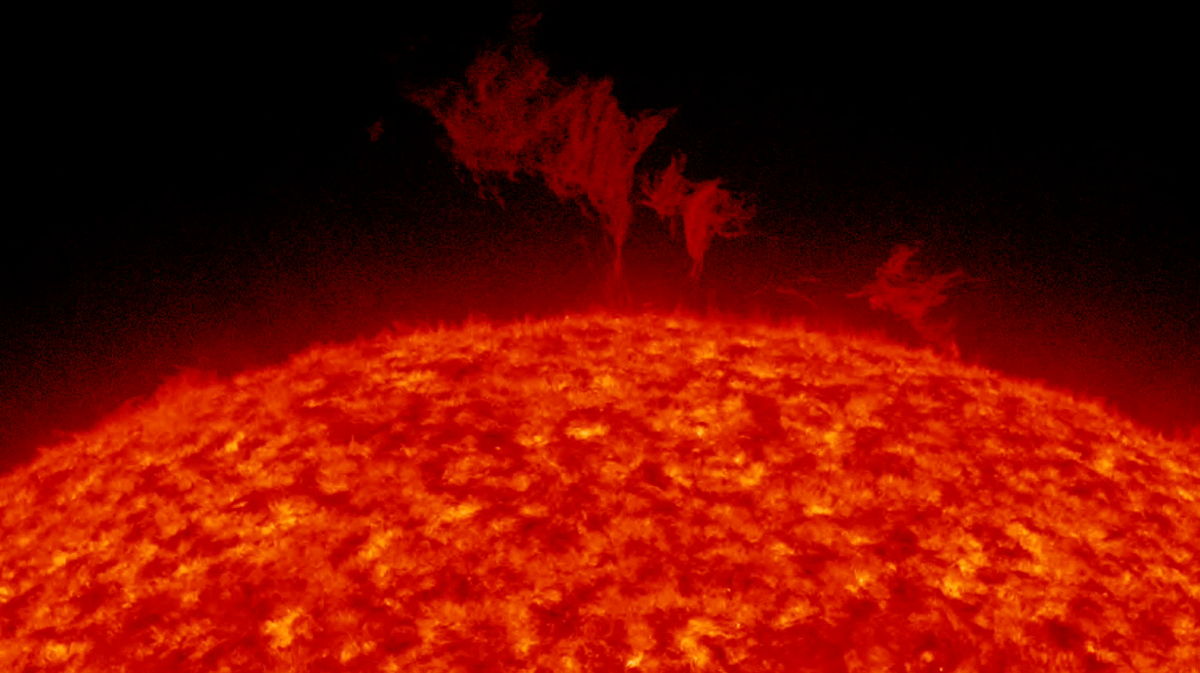Newly named Artemis 2 crew to notch many firsts on historic moon mission
'I think that records and firsts are notable and they need to happen and we need to celebrate them. But I think seconds and thirds are much more important.'

The four astronauts who will fly on NASA's Artemis 2 mission are set to break records and establish a number of firsts — all starting with their being named to the crew.
Commander Reid Wiseman, pilot Victor Glover and mission specialist Christina Koch, all with NASA, and mission specialist Jeremy Hansen of the Canadian Space Agency (CSA) were announced on Monday (April 3) as the "first humans to fly to the vicinity of the moon in more than 50 years." They will spend 10 days in late 2024 testing NASA's Orion spacecraft in high Earth orbit and on a flyby voyage to and from the moon.
"It's been more than a half century since astronauts journeyed to the moon. Well, folks, that's about to change," said NASA Administrator Bill Nelson, addressing an audience of students, space program workers, nearly the entire astronaut corps and journalists in a NASA hangar at Ellington Field in Houston on Monday. "This mission to the moon will launch four pioneers, but it will carry more than astronauts. Artemis 2 will carry the hopes of millions of people around the world."
Related: NASA's Artemis program: Everything you need to know
In addition to being the first new astronauts to fly to the moon since the Apollo 17 crew did so in 1972, Wiseman, Glover, Koch and Hansen will be the first to fly on the Orion spacecraft and Space Launch System (SLS) rocket. The two vehicles completed a successful uncrewed test flight in December 2022, leading to NASA moving forward with the Artemis 2 mission.
On their way around the moon, the four astronauts are expected to set a new distance record, surpassing the 248,655 miles (216,075 nautical miles or 400,171 kilometers) that the Apollo 13 crew set in 1970 as the farthest that humans have traveled away from Earth. From that vantage point, the Artemis 2 crew will be able to look out their windows and see both the moon and Earth.
The mission will also be the first time that four people have flown to the moon together — NASA's earlier Apollo spacecraft had just three seats each — and will be the first crewed lunar mission to be an international effort, with the European Space Agency (ESA) providing the service module powering Orion and providing the thrust needed to maneuver in space and reach the moon.
Get the Space.com Newsletter
Breaking space news, the latest updates on rocket launches, skywatching events and more!
Artemis accolades
The Artemis 2 mission plan and architecture are not the only record-setting aspects of the flight. The crew, as four individuals, will also be making history.
When they launch, Glover and Koch will become the first person of color and the first woman to lift off for the moon, respectively. Hansen, whose seat on Orion was arranged as part of a treaty between Canada and the U.S., will be the first non-American to leave Earth orbit and fly to the moon.

All four astronauts will be the first members of Gen X to fly to the moon. None of the Artemis 2 crew members were alive when 24 Apollo astronauts first flew to the moon between 1968 and 1972.
Wiseman and Hansen will be the first "Chumps" to make a lunar flyby as members of NASA's 20th group of astronaut candidates, chosen in 2009. Likewise, Glover and Koch will be the first "Eight Balls," the nickname given by the Chumps to the 21st astronaut group, selected in 2013.
Koch, who previously set a record for the longest single space mission by a woman, will be the first Space Camp alumna to fly to the moon. She attended the week-long experience hosted by the U.S. Space and Rocket Center in Huntsville, Alabama every summer from 1992 to 1996.
Wiseman, Glover and Koch have logged more time in space on each of their flights to the International Space Station than any of the prior moon voyagers logged over the course of their entire careers. Hansen will be the 13th astronaut to fly to the moon on his first spaceflight.
Glover, as the pilot on SpaceX's 2020 Crew-1 mission to the International Space Station, will be the first astronaut to have first launched on a commercial spacecraft before flying to the moon aboard a government vehicle (Orion). And, in a space race twist, Wiseman and Koch will be the first people to both fly on Russian spacecraft (Soyuz) and launch to the moon.
Related: SpaceX's Crew-1 astronaut mission to the International Space Station in photos
Seconds and thirds
The Artemis 2 astronauts only learned they were going to the moon within the last couple of weeks, and they do not begin training together until June, so they have not had much time to get together and reflect on what records they will be setting. But when asked on Monday, at least one crew member said that he considered something else to be more important than being first.

"I think that records and firsts are notable and they need to happen and we need to celebrate them. But I think seconds and thirds are much more important," said Glover in an interview with collectSPACE.com. "The first isn't important if it doesn't bring by a second. And so I'm really excited that this is a continuation of humans exploring deeper into the solar system."
Glover said he was more focused on the fact humans were returning to the moon, where he and his crewmates will be able to do some new things in new places.
"That's just truly how I feel about this," he said.
"I get it. NASA is going to make a lot of hoopla about the woman and race, and if we can go a few inches further than the farthest humans have gone. I get all that is important. It helps to keep the public interested in a day and age of information overload, so it matters. But I am so impressed that we've been able to continue this for so long," said Glover.
"The firsts are important, they are, but the continuation to me is so much more important," he said.
Follow collectSPACE.com on Facebook and on Twitter at @collectSPACE. Copyright 2023 collectSPACE.com. All rights reserved.
Join our Space Forums to keep talking space on the latest missions, night sky and more! And if you have a news tip, correction or comment, let us know at: community@space.com.

Robert Pearlman is a space historian, journalist and the founder and editor of collectSPACE.com, a daily news publication and community devoted to space history with a particular focus on how and where space exploration intersects with pop culture. Pearlman is also a contributing writer for Space.com and co-author of "Space Stations: The Art, Science, and Reality of Working in Space” published by Smithsonian Books in 2018.In 2009, he was inducted into the U.S. Space Camp Hall of Fame in Huntsville, Alabama. In 2021, he was honored by the American Astronautical Society with the Ordway Award for Sustained Excellence in Spaceflight History. In 2023, the National Space Club Florida Committee recognized Pearlman with the Kolcum News and Communications Award for excellence in telling the space story along the Space Coast and throughout the world.










